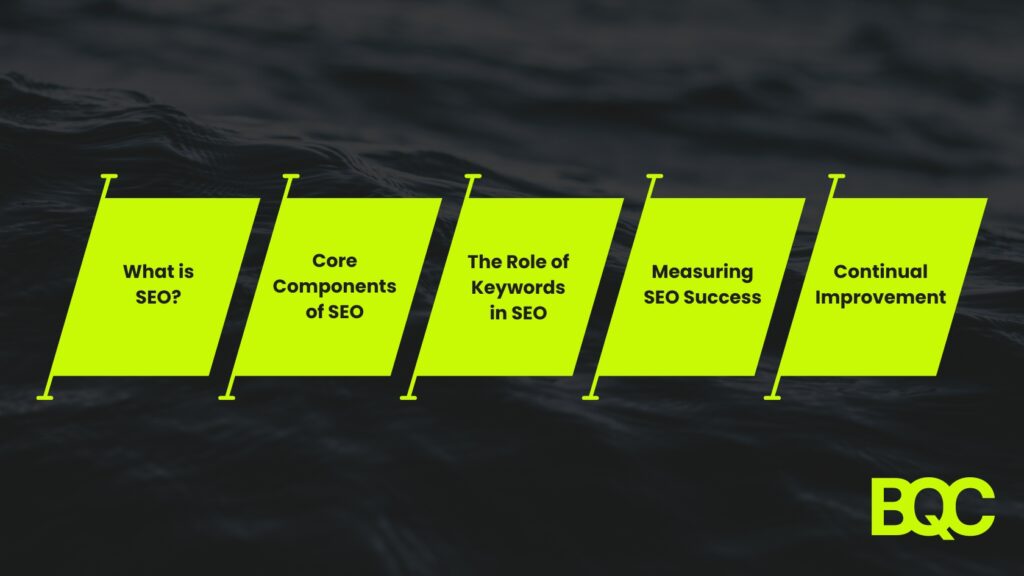Building a Strong Foundation for Your Business
Understanding SEO basics is essential for any business to enhance its online presence. SEO, or Search Engine Optimisation, involves optimising your website to perform and rank higher in search engine results, attracting more organic traffic. By mastering SEO fundamentals, businesses of all sizes can level the playing field and compete more effectively in their respective markets.
This article delves into the core components of SEO, providing you with a solid foundation to improve your website’s visibility and drive business growth. We will explore:
- What is SEO?: A clear definition of SEO and why it matters.
- Core Components of SEO: An in-depth look at the critical elements of on-page, off-page, technical SEO, and content strategy.
- The Role of Keywords in SEO: The importance of keyword research and integration.
- Measuring SEO Success: Tools and metrics to track and measure the effectiveness of your SEO efforts.
SEO basics aren’t just checkboxes; they’re the blueprint for building a robust online presence. Getting them right isn’t just essential; it’s transformative. It’s about aligning your business with the needs and desires of your audience, establishing credibility, and ultimately, driving sustainable growth. – Tom, BQC Founder
By the end of this article, you’ll have a comprehensive understanding of the SEO basics needed to enhance your digital strategy and achieve long-term success.
What is SEO?
SEO stands for Search Engine Optimisation. It encompasses a variety of techniques and strategies designed to increase your website’s visibility on search engine results pages (SERPs). By optimising your site for search engines, you can attract more visitors who are actively searching for products or services like yours.
Understanding SEO basics is crucial because it directly impacts your website’s ability to attract and retain visitors. Higher rankings in search results lead to increased visibility, more traffic, and, ultimately, higher conversion rates. Effective SEO strategies can help your business compete in a crowded digital marketplace.
Core Components of SEO
Understanding SEO basics is essential, but to truly excel in the digital landscape, you need to dive deeper into the core components of SEO.
These components are the building blocks that form a comprehensive and effective SEO strategy. By focusing on these areas, you can optimise your website to perform well in search engine results, improve user experience, and ultimately drive more qualified traffic. This section will cover the fundamentals of on-page SEO, off-page SEO, technical SEO, and content strategy, providing you with the knowledge to create a robust SEO foundation for your business.
Let’s explore these core components in detail:
- On-Page SEO: Learn how to optimise individual web pages to improve search engine rankings through targeted keywords, meta tags, and high-quality content.
- Off-Page SEO: Understand the importance of external factors such as backlinks and social signals in enhancing your site’s authority and credibility.
- Technical SEO: Discover the backend elements that affect your website’s performance, including site speed, mobile-friendliness, and proper indexing.
- Content Strategy: Develop a content plan that aligns with SEO best practices, ensuring your content is engaging, relevant, and optimised for search engines.
On-Page SEO
On-page SEO refers to optimising individual web pages to improve search engine rankings. Key elements of on-page SEO basics include:
- Keyword Research: Identifying and targeting relevant keywords your potential customers are searching for.
- Title Tags: Crafting compelling and keyword-rich titles for each page.
- Meta Descriptions: Writing informative and engaging meta descriptions that encourage clicks.
- Headings: Using H1, H2, and H3 tags to structure your content logically and make it easier for search engines to understand.
- Content Quality: Creating high-quality, valuable content that meets the needs of your audience.
- Internal Linking: Linking to other relevant pages on your website to improve navigation and user experience.
Off-Page SEO
Off-page SEO basica involves activities that take place outside of your website but still impact your search engine rankings. This primarily includes:
- Backlinks: Acquiring high-quality backlinks from reputable websites to boost your site’s authority.
- Social Signals: Leveraging social media to increase your content’s reach and engagement.
- Guest Blogging: Writing articles for other websites to build your brand and gain valuable backlinks.
Technical SEO
Technical SEO focuses on the backend elements of your website to ensure it meets the technical requirements of search engines. Key aspects of technical SEO include:
- Site Speed: Optimising your website to load quickly, as slow-loading pages can negatively impact rankings.
- Mobile-Friendliness: Ensuring your website is responsive and performs well on mobile devices.
- XML Sitemaps: Creating and submitting an XML sitemap to help search engines crawl and index your site.
- Robots.txt: Using a robots.txt file to guide search engines on which pages to crawl and index.
Content Strategy
Content is the cornerstone of SEO. A well-defined content strategy involves the following:
- Content Creation: Regularly producing high-quality, relevant content that addresses your audience’s needs and interests.
- Content Optimisation: Ensuring your content is optimised for keywords and readability.
- Content Promotion: Sharing your content across various platforms to increase visibility and engagement.
By mastering these core components, you can create a well-rounded SEO strategy that drives sustainable growth and success for your business in the digital age.
The Role of Keywords in SEO
Keywords are the foundation of any successful SEO strategy. They serve as the bridge between what people are searching for and the content you provide to meet their needs. Understanding how to use keywords effectively can significantly impact your website’s visibility and search engine rankings.
In this section, we’ll explore the critical role of keywords in SEO, breaking it down into two main areas:
- Keyword Research: Learn how to identify your industry’s most relevant and high-performing keywords. Effective keyword research involves understanding what your potential customers are searching for and finding keywords that balance search volume and competition. Tools like Google Keyword Planner, Ahrefs, and SEMrush are invaluable for uncovering these insights.
- Keyword Integration: Discover the best practices for incorporating keywords into your website content. This involves strategically placing keywords in title tags, meta descriptions, headings, and throughout your content to ensure it’s both user-friendly and optimised for search engines. However, avoiding keyword stuffing is crucial, which can lead to penalties and hurt your rankings.
Keyword Research
Understanding SEO basics begins with effective keyword research.
This foundational process involves identifying the terms and phrases your potential customers use when searching for products or services similar to yours. You can optimise your content by pinpointing these keywords to match user intent, enhancing your site’s visibility and relevance.
Why Keyword Research is Crucial
Keyword research is vital because it guides the direction of your SEO strategy.
Knowing what your audience is searching for allows you to tailor your content to meet their needs, resulting in higher engagement and conversion rates. Additionally, well-researched keywords help you understand market trends, identify new opportunities, and stay ahead of the competition.
Tools for Keyword Research
Several tools can assist you in finding relevant keywords with high search volume and low competition. These tools provide insights into keyword performance and help you make informed decisions:
- Google Keyword Planner: A free tool that offers keyword ideas and traffic estimates, helping you identify the most effective keywords for your campaigns.
- Ahrefs: A comprehensive tool that provides keyword data, competitor analysis, and backlink tracking, making it easier to uncover valuable keyword opportunities.
- SEMrush: An all-in-one tool that offers detailed keyword analysis, competitive insights, and SEO audit capabilities, helping you refine your keyword strategy.
Steps in Keyword Research
- Brainstorm Seed Keywords: Start by brainstorming a list of broad topics related to your business. These seed keywords will serve as the foundation for further research.
- Use Keyword Tools: Enter your seed keywords into keyword research tools to generate a list of related keywords. Look for terms with a high search volume and low competition.
- Analyse Search Intent: Understand the intent behind each keyword. Determine whether users are looking for information, making a purchase, or seeking a specific service.
- Evaluate Keyword Difficulty: Assess the competition for each keyword. Tools like Ahrefs and SEMrush provide a keyword difficulty score, indicating how hard it will be to rank for a particular term.
- Prioritise Keywords: Select keywords that align with your business goals and have the potential to drive the most relevant traffic to your site.
Keyword Integration
Once you’ve identified your target keywords, the next step is to integrate them naturally into your content. Effective keyword integration ensures your content is user-friendly and optimised for search engines.
SEO Basics Best Practices for Keyword Integration
- Title Tags: Include your primary keyword in the title tag of each page. This helps search engines understand the page’s topic and improves its relevance in search results.
- Headings (H1, H2, H3): Use keywords in headings to structure your content and make it easier for search engines to crawl and understand. Headings also improve readability for users.
- Meta Descriptions: Write engaging meta descriptions that incorporate your primary keyword. Although meta descriptions don’t directly impact rankings, they influence click-through rates by summarising your page.
- Body Content: Integrate keywords naturally throughout your content. Aim for a keyword density of around 1-2%, ensuring the content remains readable and valuable to your audience.
- URL Structure: Include keywords in your URL structure to improve search engine readability and relevance. For example, use “yourwebsite.com/keyword-topic” instead of “yourwebsite.com/page1”.
- Image Alt Text: Use keywords in images’ alt text to enhance accessibility and provide additional context for search engines.
Avoiding Keyword Stuffing
While integrating keywords is essential, it’s crucial to avoid keyword stuffing—overloading your content with keywords to manipulate rankings. Keyword stuffing can lead to search engine penalties and negatively impact user experience. Instead, focus on creating high-quality, informative content that naturally incorporates keywords.
Mastering keyword research and integration can enhance your website’s relevance and visibility in search engine results, attracting more organic traffic and potential customers. Keywords serve as the cornerstone of your SEO strategy, guiding the creation of content that meets user intent and drives business growth.
Measuring SEO Success
Understanding the effectiveness of your SEO efforts is crucial for continuous improvement and long-term success. Measuring SEO success involves tracking various metrics and analysing data to determine your strategies’ performance. By regularly monitoring key performance indicators (KPIs), you can identify what’s working, what needs adjustment, and where to focus your efforts for maximum impact.
In this section, we will explore:
- Analytics Tools: Essential tools like Google Analytics and Google Search Console provide valuable insights into your website’s performance.
- Key Metrics: The critical metrics to monitor include organic traffic, bounce rate, conversion rate, and backlink profile.
By mastering the art of measuring SEO success, you can make data-driven decisions, optimise your strategies, and achieve your business goals more effectively. This section will guide you through the essential tools and metrics to track, ensuring that your SEO efforts deliver tangible results and contribute to overall digital marketing success.
Utilising powerful analytics tools is essential to measure the success of your SEO efforts. These tools provide comprehensive insights into your website’s performance, enabling you to make informed decisions and optimise your strategies for better results. The two most widely used tools for tracking SEO performance are Google Analytics and Google Search Console.
Google Analytics is a robust tool that offers a deep dive into your website’s traffic and user behaviour. Here’s how it can help you measure SEO success:
- Traffic Sources: Understand where your visitors are coming from, whether it’s organic search, direct visits, social media, or referral links. This helps you gauge the effectiveness of your SEO efforts compared to other marketing channels.
- User Behaviour: Analyse how users interact with your site. Metrics such as average session duration, pages per session, and bounce rate provide insights into user engagement and content performance.
- Conversion Tracking: Set goals to track specific actions, such as form submissions, purchases, or newsletter sign-ups. This helps you measure SEO’s direct impact on your business objectives.
Google Search Console is another invaluable tool designed to monitor and improve your site’s presence in Google Search results. Key features include:
- Search Performance: Track your site’s performance in Google Search, including clicks, impressions, average position, and click-through rate (CTR) for individual keywords. This data helps you understand which keywords drive traffic and how users find your site.
- Index Coverage: Monitor which pages of your site are indexed by Google and identify any issues that may prevent certain pages from being indexed. This ensures that your content is discoverable by search engines.
- Technical Insights: Identify and fix technical issues such as crawl errors, mobile usability problems, and security issues. Maintaining a technically sound website is crucial for effective SEO.
Key Metrics
Monitoring the right metrics is crucial for evaluating the success of your SEO efforts. Here are the key metrics to track:
Organic Traffic refers to the number of visitors who arrive at your site through search engine results. This is a direct indicator of your SEO performance. Increasing organic traffic means more users find your site through relevant search queries.
Bounce Rate is the percentage of visitors who leave your site after viewing only one page. A high bounce rate may indicate that users need help finding what they’re looking for or that your site’s content needs to be more engaging. Analysing this metric helps you identify areas for improvement to enhance user experience and engagement.
Conversion Rate is the percentage of visitors who complete a desired action, such as purchasing, filling out a contact form, or signing up for a newsletter. Tracking this metric allows you to measure the effectiveness of your SEO in driving valuable actions that contribute to your business goals.
Backlink Profile evaluates the quality and quantity of websites linking to your site. High-quality backlinks from reputable sites boost your site’s authority and improve its search engine rankings. Tools like Ahrefs, Moz, and SEMrush can help you analyse your backlink profile and identify opportunities for acquiring more high-quality links.
You can gain valuable insights into your SEO performance by leveraging analytics tools like Google Analytics and Google Search Console and focusing on key metrics such as organic traffic, bounce rate, conversion rate, and backlink profile. Regularly monitoring these metrics enables you to make data-driven decisions, refine your strategies, and achieve your SEO goals more effectively.
Embracing SEO Basics for Long-Term Success
Understanding SEO basics is crucial for any business aiming to thrive in the digital landscape. By mastering the core components of SEO—on-page optimisations, off-page strategies, technical SEO, and content development—you can significantly enhance your website’s visibility and attract more organic traffic.
Effective SEO practices drive business growth and establish your brand as a credible and authoritative presence in your industry.
Recap of Core Components
- On-Page SEO: Optimise individual web pages through targeted keywords, meta tags, and high-quality content to improve search engine rankings.
- Off-Page SEO: Build authority and trust through high-quality backlinks, social signals, and guest blogging.
- Technical SEO: Ensure your website meets technical requirements, such as fast loading speeds, mobile-friendliness, proper indexing, and secure connections.
- Content Strategy: Develop and promote valuable, relevant content that meets the needs of your audience and aligns with SEO best practices.
The Role of Keywords
Effective keyword research and integration are SEO basics and fundamental to SEO success. By understanding what your potential customers are searching for and incorporating those keywords naturally into your content, you can improve your site’s relevance and search engine rankings.
Measuring SEO Success
Utilising analytics tools like Google Analytics and Google Search Console is essential for tracking the effectiveness of your SEO efforts. Monitoring key metrics such as organic traffic, bounce rate, conversion rate, and backlink profile allows you to make data-driven decisions and continuously refine your strategies.
Continuous Adaptation and Improvement
SEO is not a one-time task but a continuous process that requires ongoing effort and adaptation.
Search engine algorithms constantly evolve, and staying updated with the latest trends and best practices is vital to maintaining your competitive edge. Regularly review and adjust your SEO strategies to ensure they remain effective and aligned with your business goals.
SEO Basics Wrapped
Investing in a solid SEO foundation today can position your business for sustained success in the ever-evolving digital landscape. By embracing SEO basics and committing to continuous improvement, you can build a solid online presence, attract organic traffic, and drive significant business growth.
Remember, the key to successful SEO lies in understanding your audience, creating valuable content, and adapting to the changing digital environment. With dedication and the right approach, you can achieve remarkable results and unlock new opportunities for your business to thrive.
Ready to take your SEO to the next level? Don’t let your competitors outshine you in the search results. Start implementing these SEO basics today to boost your online visibility and drive more organic traffic to your site. If you need expert guidance, consider partnering with an experienced SEO strategist who can tailor a strategy to your unique business needs.
Contact us now to schedule a consultation and learn how we can help you achieve sustained growth and success.







